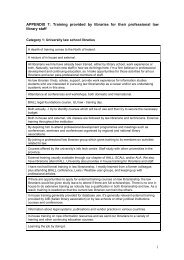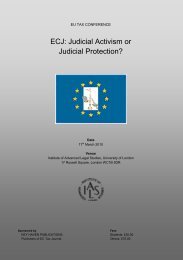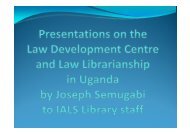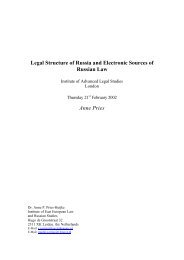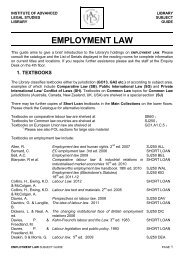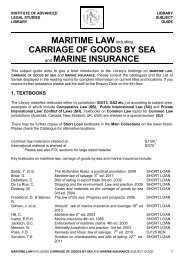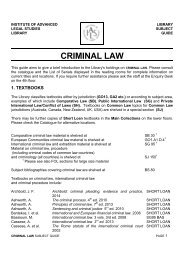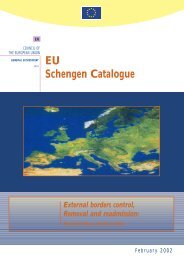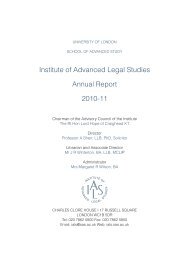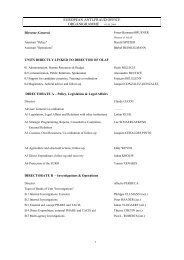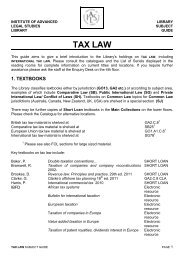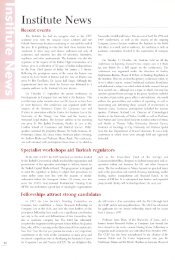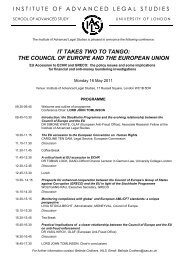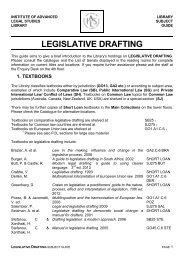a thesis - Institute of Advanced Legal Studies
a thesis - Institute of Advanced Legal Studies
a thesis - Institute of Advanced Legal Studies
Create successful ePaper yourself
Turn your PDF publications into a flip-book with our unique Google optimized e-Paper software.
CONSTRUCTION OF EXPRESS TRUSTS. 65<br />
as having been finally established by the leading case <strong>of</strong> Glenorchy<br />
v. Sosmlle (1733, Gas. t. Talbot, 3 ; Wh. & Tud. L. 0. Eq. 7th ed.<br />
vol. ii. 763 ; see Lord Hardwicke's remark at 2 Atk. 582).<br />
Although, however, it is now completely settled that the distinction<br />
exists for the purposes <strong>of</strong> interpretation (see Sackville- West<br />
v. Viscount Holmesdale (1870), L. E. 4 H. L. 543), the precise<br />
method <strong>of</strong> determining to which class a trust belongs is not so<br />
clearly stated in the cases. (See Wh. & Tud. L. C. Eq. 7th ed.<br />
vol. ii. 771.) " The words ' executory trust,'" said Lord Northington<br />
in Austen v. Taylor (1759, 1 Eden, 366), "seem to me to have no<br />
fixed signification." Lord King, in the case <strong>of</strong> Papitton v. Voice,<br />
describes an executory trust to be where the party must come to<br />
this court to have the benefit <strong>of</strong> the will. But that is the case <strong>of</strong><br />
every trust. Later on in the same case he says: " The true<br />
criterion is this : wherever the assistance <strong>of</strong> trustees, which is ultimately<br />
the assistance <strong>of</strong> this court, is necessary to complete a<br />
limitation, that is sufficient evidence <strong>of</strong> the testator's intention that<br />
the court should model the limitations. But where the trusts and<br />
limitations are already expressly declared, the court has no authority<br />
to interfere, and make them different from what they would be at<br />
law."<br />
" All trusts are in a sense executory," said Lord St. Leonards in<br />
Egerton v. EarlBroicnloic (1853, 4 H. L. Ca. at p. 211), "because<br />
a trust cannot be executed except by a conveyance, and therefore<br />
there is always something to be done. But this is not the sense<br />
which a court <strong>of</strong> equity puts upon the term ' executory trust.' A<br />
court <strong>of</strong> equity considers an executory trust as distinguished from<br />
a trust executing itself, and distinguishes the two in this manner:<br />
Has the testator been what is called, and very properly called, his<br />
own conveyancer ? Has he left it to the court to make out from<br />
general expressions what his intention is, or has he so defined that<br />
intention that you have nothing to do but to take the limitations<br />
he has given to you and to convert them into legal estates ? "<br />
" It is <strong>of</strong> the essence <strong>of</strong> an executory trust that it should not<br />
be fully expressed or declared in the instrument creating it, but<br />
that it should require some further deed or instrument for its<br />
complete legal expression," said Lord Westbury in Sackville-West<br />
v. Viscount Holmesdale (1870, L. E. 4 H. L. at p. 566).<br />
"An executory trust," according to Lord Cairns in the same<br />
case (p. 571), is "a trust which is to be executed by the preparation<br />
<strong>of</strong> a complete and formal settlement, carrying into effect, through<br />
H. F



